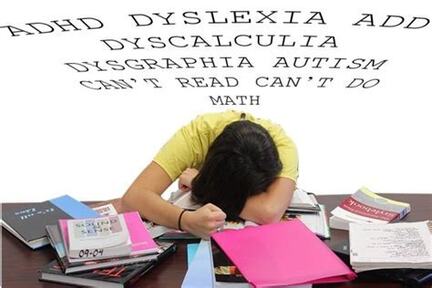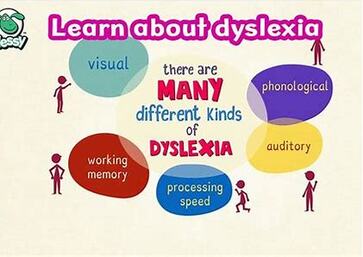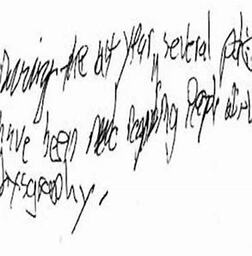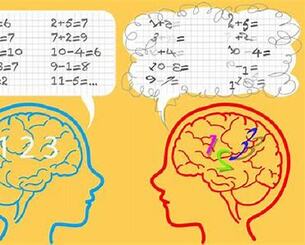Learning Disabilities: An Overview
By: LD OnLine. Retrieved from – http://www.ldonline.org/article/5613/
Excerpts from this article:
- What is a learning disability?
- What are some types of learning disabilities?
- Dyslexia (difficulty reading)
- Dysgraphia (difficulty writing)
- Dyscalculia (difficulty with mathematics)
What is a learning disability?
Some individuals, despite having an average or above average level of intelligence, have real difficulty acquiring basic academic skills. These skills include those needed for successful reading, writing, listening, speaking and/or math. These difficulties might be the result of a learning disability.
The Individuals with Disabilities Education Act (#IDEA), a federal law, defines a learning disability as a condition when a child's achievement is substantially below what one might expect for that child. Learning disabilities do NOT include problems that are primarily the result of emotional disturbance, or visual, hearing, emotional or intellectual disabilities.
Many children with LD have struggle with reading. The difficulties often begin with individual sounds, or phonemes. Students may have problems with rhyming, and pulling words apart into their individual sounds (segmenting) and putting individual sounds together to form words (blending). This makes it difficult to decode words accurately, which can lead to trouble with fluency and comprehension. As students move through the grades, more and more of the information they need to learn is presented in written (through textbooks) or oral (through lecture) form. This exacerbates the difficulties they have succeeding in #school.
What are the types of learning disabilities?
#LD is a broad term. There are many different kinds of learning disabilities. Most often they fall into three broad categories:
- Reading disabilities (often referred to as #dyslexia)
- Written language disabilities (often referred to as #dysgraphia)
- Math disabilities (often called #dyscalculia)
Other related categories include disabilities that affect memory, social skills, and executive functions such as deciding to begin a task.
Dyslexia is characterized by difficulties with accurate and/or fluent word recognition and by poor spelling and decoding abilities. Reading disabilities affect 2 to 8 percent of elementary school children. To read successfully, one must:
- Focus attention on the printed symbols
- Recognize the sounds associated with letters
- Understand words and grammar
- Build ideas and images
- Compare new ideas to what you already know
- Store ideas in memory
A person with dyslexia can have problems in any of the tasks involved in reading. However, scientists found that a significant number of people with dyslexia share an inability to distinguish or separate the sounds in spoken words. Some children have problems sounding out words, while others have trouble with rhyming games, such as rhyming "cat" with "bat." Yet, scientists have found these skills fundamental to learning to read.
Fortunately, remedial reading specialists have developed techniques that can help many children with dyslexia acquire these skills. However, there is more to reading than recognizing words. If the brain is unable to form images or relate new ideas to those stored in memory, the reader cannot understand or remember the new concepts. Other types of reading disabilities can appear in the upper grades when the focus of reading shifts from word identification to comprehension.
< My Thoughts > “…rhyming "cat" with "bat."
Another way for a new reader to experience how one letter can change a word, thus changing the meaning altogether is to try this. Say, “How can I change a “cat” into a “bat”? Oh, by changing the letter “c” to the letter “b”! So simple and children love it. Let them try the next one. For instance, change a “cat” into a “hat”… and so on.
Writing too, involves several brain areas and functions. The brain networks for vocabulary, grammar, hand movement, and memory must all be in good working order. A developmental writing disorder may result from problems in any of these areas. For example, a child with a writing disability, particularly an expressive language disorder, might be unable to compose complete and grammatically correct sentences.
< My Thoughts > “…brain networks… must all be in good working order.”
For some reason, I cannot give specifics here… only teaching experience… a child with ASD can keyboard on the computer more easily than trying to put pencil to paper.
Arithmetic involves recognizing numbers and symbols, memorizing facts, aligning numbers, and understanding abstract concepts like place value and fractions. Any of these may be difficult for children with developmental arithmetic disorders, also called dyscalculia. Problems with number or basic concepts are likely to show up early. Disabilities that appear in the later grades are more often tied to problems in reasoning.
< My Thoughts > “…recognizing numbers and symbols…”
If a child reverses or mixes up letters, there might be a good chance that the same thing occurs when they encounter numbers. Then when ‘word problem’ show up in the curriculum you have a real problem on you hands. Associating number value with the number or word which represents it takes ‘real’ effort. There are ways to work through this problem, one must just find it.
REFERENCE:
Xin, J., Sheppard, M., et al. (2017). Brief Report: Using iPads for Self-Monitoring of Students with Autism; Journal of Autism & Developmental Disorders; V47, p1559-1567.





 RSS Feed
RSS Feed